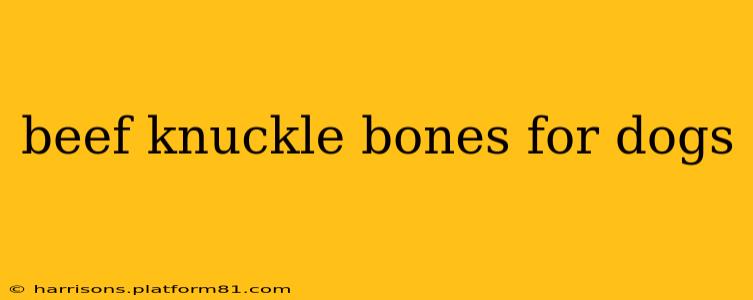Beef knuckle bones are a popular choice among dog owners looking for a long-lasting, natural chew toy that can also provide dental benefits. However, it's crucial to understand the advantages, potential risks, and how to choose the right knuckle bone for your canine companion. This comprehensive guide will answer all your questions about beef knuckle bones for dogs.
Are Beef Knuckle Bones Safe for Dogs?
This is arguably the most important question. The short answer is: generally, yes, but with caveats. Beef knuckle bones are a natural, digestible chew, unlike many processed dog chews. They can help clean teeth, satisfy a dog's chewing instinct, and provide mental stimulation. However, the safety depends on factors like the bone's size, your dog's size and chewing habits, and how you supervise the chewing process. Always supervise your dog while they are chewing on any bone.
What are the Benefits of Beef Knuckle Bones for Dogs?
Beef knuckle bones offer several benefits for your furry friend:
- Dental Health: Chewing on a knuckle bone can help remove plaque and tartar buildup, promoting healthier teeth and gums.
- Mental Stimulation: Chewing provides mental enrichment and helps satisfy a dog's natural instinct to gnaw. This is especially beneficial for dogs prone to boredom or anxiety.
- Long-lasting Chew: Knuckle bones are durable and provide a long-lasting chewing experience, unlike softer treats that are quickly consumed.
- Natural and Digestible: Unlike many processed chews, beef knuckle bones are a natural product, and the digestible parts can contribute to a dog's nutrient intake.
What are the Risks of Giving Beef Knuckle Bones to Dogs?
While generally safe, there are potential risks associated with giving your dog beef knuckle bones:
- Choking Hazard: Smaller pieces can break off and pose a choking hazard, especially for small dogs or those who tend to gulp their food.
- Tooth Damage: Extremely hard bones can, in rare cases, damage teeth.
- Digestive Upset: Large pieces can cause digestive issues, such as constipation or stomach upset.
- Bacterial Contamination: Bones from unapproved sources can carry bacteria. Always choose reputable sources.
How to Choose the Right Beef Knuckle Bone for Your Dog?
Selecting the appropriate size is crucial. Choose a bone that is significantly larger than your dog's mouth to prevent choking and ensure it's too large to swallow whole. For small dogs, consider smaller rawhide or other less hard chews, or very small knuckle bones sourced from a reputable butcher and carefully supervised. Larger dogs will need proportionately larger bones. Never give a bone that your dog can easily break into small pieces.
Where to Buy Beef Knuckle Bones for Dogs?
Reputable butchers or pet stores specializing in natural chews are your best bet. Avoid bones purchased from unreliable sources, as these could be contaminated or of poor quality.
How to Safely Supervise Your Dog Chewing on a Knuckle Bone?
Always supervise your dog while chewing. Remove the bone if it becomes too small or if your dog is showing signs of discomfort or struggling to chew it. Dispose of broken pieces appropriately.
Are Raw Beef Knuckle Bones Better Than Cooked?
There's some debate about raw versus cooked bones. Raw bones are generally considered slightly safer as they are less likely to splinter, but both options carry inherent risks. Ensure you make your decision based on your understanding of the risks involved.
Can I Give My Dog Other Types of Bones Besides Beef Knuckle Bones?
Yes, other bones, such as lamb or chicken bones, are sometimes offered. However, be extremely cautious as some types of bones are more likely to splinter than others. Always research before introducing a new type of bone to your dog's diet.
What Should I Do if My Dog Chokes on a Beef Knuckle Bone?
If your dog is choking, seek immediate veterinary attention. Do not attempt to remove the bone yourself unless you are trained to do so.
This guide provides comprehensive information about beef knuckle bones for dogs. Remember, responsible pet ownership includes making informed decisions about your dog's health and safety. Always prioritize your dog's well-being and consult your veterinarian if you have any concerns.
